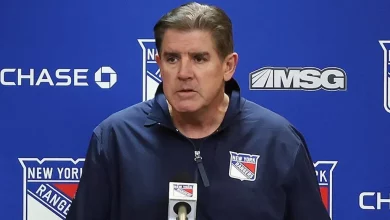Oilers GM states contract negotiations with McDavid will start whenever the player and team are prepared, emphasizing a flexible approach to future discussions.

In the world of professional sports, few contracts attract as much attention and speculation as those of elite players like Connor McDavid. As the captain and cornerstone of the Edmonton Oilers, McDavid’s contract negotiations are watched closely by fans, analysts, and the hockey community at large. Recently, the Oilers’ General Manager (GM) made a statement emphasizing a patient and flexible approach, declaring that negotiations will begin “whenever they’re ready.” This seemingly simple declaration carries significant implications for the team’s strategy, the player’s future, and the broader NHL landscape.
This article explores the context of the statement, the importance of McDavid’s contract, the factors influencing negotiation timing, the Oilers’ philosophy on negotiations, and what this approach indicates about their future plans. We will also analyze the potential impact on the team, the player, and the league, providing a comprehensive understanding of this critical moment in Edmonton’s hockey history.
1. The Significance of Connor McDavid
The Player’s Impact
Connor McDavid is widely regarded as one of the most talented and influential players in the NHL. Since being drafted first overall in 2015, he has consistently been a top contender for the Hart Trophy (MVP), Art Ross Trophy (leading scorer), and other accolades. His speed, vision, hockey IQ, and leadership qualities have transformed the Oilers’ fortunes—turning a struggling franchise into a playoff contender.
Leadership and Expectations
As captain since 2016, McDavid embodies the identity of the Oilers. His leadership on and off the ice, combined with his production, has set high expectations for the franchise’s future. Securing his long-term commitment via an extension is viewed as essential to maintaining stability and competitiveness.
Marketability and League Impact
Beyond his on-ice skills, McDavid’s marketability makes him one of the league’s most valuable assets. His presence boosts ticket sales, merchandise, and global interest in the Oilers. His contract negotiations are, therefore, of considerable business importance for the team and the league.
2. Context of the Contract Negotiations
Background: The Current Contract and Future Outlook
McDavid’s current deal, signed in 2018, is a seven-year contract with an annual cap hit of approximately $12.5 million. Given his performance, many analysts predicted he would seek a significant payday upon expiry, potentially surpassing the league’s highest-paid players.
Rising Salary Cap and Market Trends
The NHL salary cap has been rising steadily, driven by increased revenue from TV deals, sponsorships, and merchandise. The trajectory suggests that top players like McDavid could command contracts exceeding $15 million annually—possibly in the range of $16-17 million, depending on negotiations.
The Importance of Timing
The timing of negotiations is critical. Some players prefer to secure long-term deals early in their careers, while others opt to wait until closer to free agency. The league’s salary cap environment, team competitiveness, and player priorities all influence this timing.
3. The Oilers’ Approach: Patience and Flexibility
A Strategic Choice
The Oilers’ GM’s statement reflects a strategic patience, indicating they are willing to wait until McDavid and the team feel comfortable to begin negotiations. This approach underscores respect for the player’s comfort and readiness, perhaps aiming to avoid unnecessary pressure or distraction.
Why Not Rush?
Player’s Perspective: McDavid may prefer to focus on his game and team success first, delaying contract talks until he feels it’s the right time.
Team’s Position: The Oilers might be assessing their roster, cap space, and future plans to position themselves optimally for negotiations.
Market Conditions: The league’s cap projections and player market dynamics are evolving, and the team may want to wait for the best possible terms.
Flexibility as a Core Principle
By emphasizing flexibility, the GM signals an openness to adapt to circumstances, whether that means starting negotiations later, adjusting terms, or exploring different contractual structures. This approach can foster a more collaborative environment and potentially lead to a more favorable agreement for both parties.
4. Factors Influencing the Timing of Negotiations
Several key factors influence when negotiations will begin and how they will proceed:
a) Player’s Readiness and Focus
McDavid’s priorities likely include maintaining peak performance, team success, and personal goals. If he perceives negotiations as a distraction or a source of stress, he may prefer to delay until he feels prepared.
b) Team’s Cap Situation and Roster Planning
The Oilers need to manage their salary cap effectively, balancing McDavid’s extension with other roster needs. They may also be considering future roster moves, draft picks, and other signings.
c) League’s Salary Cap Trajectory
A stable or rising cap environment can influence negotiations. If the cap is expected to increase significantly, both sides might prefer to wait for better financial parameters.
d) Contract Structures and Negotiation Strategies
Teams and players often explore various contractual arrangements—long-term deals, short-term contracts, signing bonuses, performance incentives, and clauses. The timing can depend on the preferred structure.
e) External Factors
Injuries, team performance, league-wide negotiations, and even external events (like economic fluctuations or global issues) can impact when negotiations commence.
5. Implications of a “Whenever They’re Ready” Approach
a) Positive Outcomes
Respect and Trust: Demonstrates mutual respect between the player and team, fostering a positive relationship.
Optimal Negotiating Environment: Allows both parties to approach discussions when they are most prepared, potentially leading to better terms.
Focus on Performance: The player can focus solely on his game without distraction, which can translate into better performance and a stronger negotiating position later.
Strategic Timing: The team can wait for favorable market conditions or cap increases, maximizing value.
b) Potential Challenges
Uncertainty and Speculation: Fans and media may speculate about delays, leading to uncertainty and distraction.
Risk of Distraction: If negotiations are delayed too long, it could impact the player’s focus or create tension.
Market Fluctuations: Waiting too long might result in changing market conditions that could complicate negotiations.
c) Significance for the Franchise
The Oilers’ patient stance signals a long-term view, prioritizing a relationship-based negotiation rather than rushing into an agreement. This can set a positive precedent for future negotiations with other players and demonstrate a mature, strategic franchise approach.
6. Historical Context and Comparisons
Previous Contract Negotiations in the NHL
Sidney Crosby: Crosby’s negotiations were characterized by patience, culminating in a lucrative, long-term deal that reflected his franchise leadership.
Auston Matthews: The Maple Leafs’ star took time to negotiate a contract that balanced cap considerations with player expectations.
NHL Trends: Many top-tier players prefer to wait until closer to free agency or until team and league conditions are optimal.
Lessons Learned
Patience often benefits both players and teams, allowing for better-informed agreements that can include performance incentives, no-trade clauses, or other contractual nuances. The Oilers’ approach aligns with these successful strategies.
7. The Broader NHL Landscape and Strategic Considerations
Market Competition
The NHL is increasingly competitive, with multiple teams vying for top talent. The Oilers’ patient approach might give them an advantage by allowing negotiations to evolve and for the team to position itself strategically.
Cap Management and Future Planning
Waiting can give the Oilers flexibility to manage their salary cap, plan for other signings, or even explore trades if necessary.
Player Loyalty and Satisfaction
Demonstrating patience and respect can foster loyalty, increasing the likelihood that McDavid remains committed long-term, which is crucial for team stability.
8. What Could Future Negotiations Look Like?
Potential Contract Structures
Long-Term Deals: These provide stability and financial security for McDavid, often spanning 8 or more years.
Shorter-term Contracts: These offer flexibility but may be less appealing to a player seeking long-term security.
Incentives and Bonuses: Performance-based incentives, signing bonuses, or clauses related to team success or individual milestones.
Negotiation Themes
Cap Flexibility: Both sides may prioritize contracts that allow for future cap management.
Player Control: McDavid may seek clauses that give him some control over his destiny, such as no-movement clauses.
Team Commitments: The team will aim to balance McDavid’s expectations with their roster and financial plans.
9. Potential Impact on the Edmonton Oilers
On-Ice Benefits
Securing McDavid’s long-term commitment ensures stability at the core of the roster, providing leadership and skill that can lead to sustained success.
Off-Ice Benefits
The negotiation approach sends a message of professionalism and mutual respect, enhancing the team’s reputation among players and agents.
Fan and Market Impact
A timely and successful extension would boost fan confidence, ticket sales, and merchandise revenue, reinforcing Edmonton’s status as a hockey city.
Patience as a Virtue in Contract Negotiations
The Edmonton Oilers’ GM’s statement—that negotiations with Connor McDavid will commence “whenever they’re ready”—reflects a strategic, respectful, and patient approach to one of the most critical contracts in NHL history. It underscores the importance of timing, mutual readiness, and flexibility in negotiations involving elite players.
While it may test the patience of fans eager for resolution, this approach ultimately prioritizes building a solid foundation for a long-term partnership. It acknowledges that the best deals are often those struck in a climate of mutual respect and preparedness.
In the high-stakes world of professional hockey, patience can be a virtue—one that pays dividends when executed with foresight and care. The Oilers’ management appears committed to this philosophy, signaling a confident belief that, when the time is right, they will strike an agreement that benefits both McDavid and the franchise.









